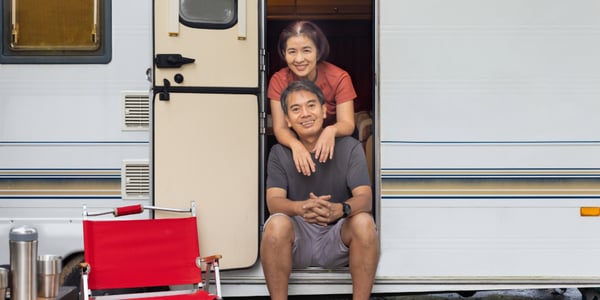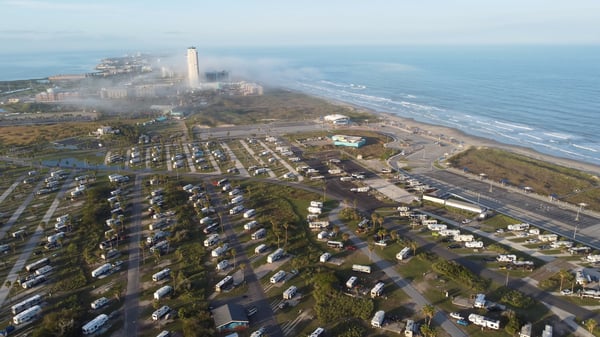In a world where jet-setting to far-flung destinations isn't always feasible, a staycation offers a...


In a world where jet-setting to far-flung destinations isn't always feasible, a staycation offers a...

There comes a time in most people’s lives when they decide to downsize to a smaller home. Whether...

When planning an RV adventure, one of the most critical decisions you'll make is where to stay. The...

For many, retirement means traveling to new places, experiencing different cultures, and seeing the...
Essential Tips for First-Time RV Buyers
The beauty of the open road, the freedom to explore new horizons, and the comfort of having a home on wheels make the idea of owning an RV an exciting prospect, especially for retirees with extra time on their hands. However, transitioning from contemplating an RV purchase to becoming a seasoned road traveler involves many decisions and considerations. In this blog, we'll review the practical aspects of navigating the RV market, making informed choices, and embracing the RV lifestyle.
Understanding Your Needs
Before diving into the expansive world of RVs, take a moment to recognize what is it you want to get out of owning an RV. Consider the unique needs and preferences of the people you’ll be traveling with. Whether you're a solo adventurer, a couple seeking romantic getaways, or a family ready for memorable road trips, understanding your needs is the foundation of a successful RV purchase.
Begin by envisioning your travel style and the type of destinations you plan to visit. Are you seeking the tranquility of nature, the fast-paced city life, or a mix of both? Assessing your ideal travel scenarios will help narrow down the multitude of RV options available.
New vs. Used: Weighing the Pros and Cons
Pros of Buying a New RV
Cons of Buying a New RV
Pros of Buying a Used RV
Cons of Buying a Used RV
Choosing the Right Type of RV
RVs come in various shapes and sizes, each designed to cater to specific preferences and needs. From motorhomes to camper vans, fifth wheels to travel trailers, the choices can be overwhelming. Assess your towing capacity, driving comfort, and parking preferences to determine the type of RV that aligns with your lifestyle.
Test Driving and Inspecting
Similar to purchasing a car, taking your potential RV for a test drive is crucial. Evaluate its performance on the road, braking system, and overall driving comfort. Once satisfied with the drive, conduct a meticulous inspection of both the interior and exterior.
Look for signs of water damage, scrutinize the roof for leaks, inspect appliances, and ensure all systems are in optimal working order. Pay attention to details such as storage space, ease of access to essential components, and overall livability. The goal is to ensure that the RV not only meets your expectations but also aligns with your travel aspirations.
Understanding RV Classes
RVs are categorized into the following classes based on size and features:
Understanding these RV classes will empower you to make informed decisions based on your preferences. Consider factors such as living space, fuel efficiency, and ease of maneuvering when deciding on the RV class that best suits your needs.
Considering Resale Value
While the initial excitement of owning your first RV is tangible, thinking ahead to potential resale is a wise move. Opt for a reputable brand with a track record of retaining value to ensure a smoother resale process when the time comes.
Trends evolve, and the RV market is no exception. Considering resale value can contribute to a more strategic and satisfying long-term investment. It's an aspect that may not be immediately apparent but can significantly impact your overall RV ownership experience.
Budgeting for Additional Expenses
Beyond the initial purchase, RV ownership entails various additional expenses. Budgeting for routine maintenance, campground fees, fuel costs, insurance, and unexpected repairs is crucial. Having a clear understanding of these ongoing expenses will enable you to plan effectively and avoid financial surprises down the road.
Routine maintenance is particularly important to keep your RV in top condition, including regular oil changes, tire inspections, and checks on the electrical and plumbing systems. Factoring in these costs from the beginning will help you maintain your RV in peak condition and avoid unexpected breakdowns during your travels.
Learning the Basics of RV Maintenance
Owning an RV requires a foundational understanding of maintenance tasks to keep your vehicle in top condition. While you may not need to become a certified mechanic, learning how to perform basic maintenance checks and troubleshoot common issues is essential.
Start by familiarizing yourself with the owner's manual, which contains valuable information about your RV's specific maintenance requirements. Learn how to perform routine checks on essential systems, change the oil, and inspect the brakes. Understanding the basics of RV maintenance saves you money on professional services and ensures a smoother and more enjoyable travel experience.
Joining the RV Community
The RV community is expansive and welcoming, with countless enthusiasts eager to share their experiences and advice. Joining RV organizations, online forums, and social media groups will connect you with fellow RVers across the country. Learning from others' experiences provides valuable insights and practical tips for making the most of your RV lifestyle.
Online forums are excellent platforms for asking specific questions, sharing your experiences, and seeking advice on everything from troubleshooting technical issues to finding the best campgrounds. Attend RV rallies and meetups to connect with like-minded individuals, share stories around the campfire, and gain insights from seasoned RV veterans.
Planning Your First Adventure
Once you've secured your RV and familiarized yourself with its intricacies, it's time to plan your first adventure. Consider starting with a short trip to a nearby campground to acclimate to RV living, allowing you to get comfortable with setting up and breaking down camp, using the RV's systems, and experiencing the unique aspects of RV travel.
As you gain confidence, gradually extend the duration and distance of your journeys. Explore different types of campgrounds, from state parks to private RV resorts, to get a feel for the diverse experiences RV travel offers. Embrace the flexibility and spontaneity that RV travel allows, but also plan ahead to ensure a smooth and enjoyable experience.
Consider creating a checklist for setting up and breaking down camp, ensuring you don't forget any essential steps. Plan your routes in advance, taking into account the RV-friendly roads and potential camping spots along the way. While spontaneity is part of the charm of RV travel, having a basic plan can enhance your overall experience.
Interested in purchasing a new RV? Dort Financial can help with an RV loan - Click here!
Living50+